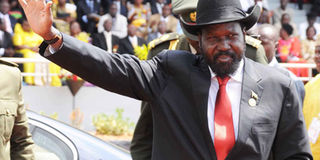South Sudan edges closer to joining EA community

South Sudan's President Salva Kiir attends Uganda's Independence Golden Jubilee celebrations at Uhuru Grounds in Kampala on October 9, 2012. Photo/FILE
What you need to know:
- High level mission to discuss country’s request to become the sixth member of regional bloc
South Sudan is inching closer to becoming a member of the East African Community with negotiations set to start.
Each of the five community member states has chosen three experts to sit at the negotiating table with a team from South Sudan from November 7.
The 15-member EAC team will draw up a programme and recommendations for South Sudan’s entry.
“They (South Sudan) have written to us confirming that they will be attending the negotiations in Arusha. They will be key to determining whether, when and how South Sudan will join the EAC,” said deputy secretary-general for planning and infrastructure, Dr Enos Bukuku.
In November 2011, months after becoming Africa’s newest state, South Sudan applied to join the community. Since then, the country has been going through the paces as its bid for membership is processed.
A verification committee was sent to South Sudan in July 2012 to assess the country’s ability to meet the membership criteria. Despite concerns about the development level of government institutions, heads of state approved the verification report last year.
EAC ministers in the five countries then directed the secretariat to put together a team that would begin negotiations with South Sudan.
After the technocrats’ meeting next month, recommendations will be forwarded to principal secretaries of the five members before ministerial negotiations begin.
Dr Bukuku said verification for Somalia, which had also applied to join, is yet to begin.
The entry of South Sudan into the community would add 10 million people to the region’s market of an estimated 150 million. Kenya and Uganda stand to benefit the most because they already trade heavily with the landlocked country.
“South Sudan’s economic interests are best routed through East Africa. The advantages of coordinating social-economic policy and opening up the South Sudanese market will be immediately felt by businesses in Kenya and Uganda,” said United States International University international relations scholar Prof Macharia Munene.
Although the countries have made a commitment to fast track South Sudan’s membership, experts say the process could take at least four years.
Dr Bukuku said the partner states will have to hold South Sudan’s hand as it builds institutions and formulates policies.
According to the treaty setting up the community, countries seeking membership must adhere to “universally acceptable principles of good governance, democracy, the rule of law, observance of human rights and social justice”.
They must also establish and maintain a market-driven economy. Potential members must also understand and accept the community as it is set out in the Treaty.
In its report, the verification committee said key institutions relating to finance and economic planning were not fully functional.
Initially, some members were opposed to South Sudan’s inclusion. While some officials pushed for immediate membership, others thought the country should first strengthen bilateral ties with individual neighbours.
“South Sudan is coming out of conflict. They need time and space to build institutions of governance. They will be assisted in doing this by international development organizations and also by the the community,” Dr Bukuku said.
Similar grace periods were granted to Rwanda and Burundi when they applied for membership.
Of late, South Sudan has been cementing ties with countries in East Africa. Juba has applied to be enjoined in an infrastructure summit that brings together Kenya, Uganda and Rwanda.
The summit was established by the three countries in June to fast track infrastructure and implementation of trade-friendly policies. A key infrastructure of the summit is construction of a standard gauge railway from Mombasa to Bujumbura via Kampala and Kigali.
The trilateral summit will meet in Kigali next week to launch a plan that would harmonise border and customs services among the three countries.
However, the infrastructure summit has raised the tensions and exposed cracks in the economic bloc. Tanzania, which hosts the community’s headquarters in Arusha, feels it has been side-lined and has come out fighting, renouncing the tripartite group, saying it contravenes the spirit of the community.
Kenya and Uganda, on the other hand, have been accused of derailing the community’s progress towards a monetary union.
Both countries missed meetings during which the five countries were supposed to approve the draft monetary union protocol.
“Uganda is holding the monetary union process hostage; it has cancelled participation in two meetings at the last minute.
The solicitor-general from Kenya was supposed to attend a meeting on Monday (October 21) but did not,” said Dr Bukuku.





